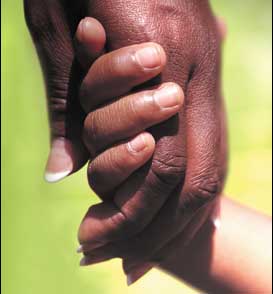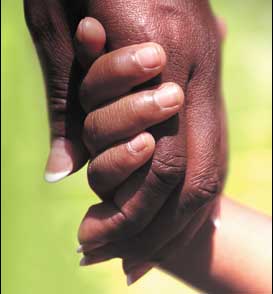 “Are you sure sweetheart that you want to be made well?”
“Are you sure sweetheart that you want to be made well?”
These are the opening lines of Toni Cade Bambara’s amazing novel The Salt Eaters where black faith healer Minnie Ransom leads a community of friends and clinicians who respond to Velma Henry’s attempted suicide.
On the next page, the healer Minnie expounds: “I like to caution folks, that’s all. No sense us wasting each other’s time.”
On the third page, the healer continues, “A lot of weight when you’re well. Now you just hold that thought.”
The gospels portray Jesus with the same prodding – but with more brevity. Before a healing miracle, Jesus asks the man who has been sick for thirty-eight years, “Do you want to be made whole?” (John 5:6) Some biblical translations write this way,
“Do you want to be made well?”
I like this question for all that’s behind it.
The healers are asking: Are you willing to have a new experience?
You know sickness, but you don’t know wellness. You’ve learned how to manage what you do know. You know it like the back of your hand. You know how it dips, turns, and immobilizes. You know the hint that today is a bad day. You know how to hide it, work through it, or surrender to it. At least I do. So are you willing to venture into the unknown? Are you ready to learn new ways of being in the world? Are you willing to trade a familiar sickness for a health you may not recognize? Are you willing to feel things you haven’t felt before? That’s a lot of weight. Are you sure you want to be made well?
The healers are asking: Are you willing to work for it?
The road from sick A to well B is not straight or paved. It winds; there are obstacles; you will fall on the path. Are you willing to get back up again? And again? You will feel like you are groping in the dark. Will you trust that there is light at the end? Until you get there, can you work with the shadows? You will need community. Can you trust those who love you? Can you hold tight with one hand and release with the other? You will have to trust in the process. You will need faith. Do you want to be made well?
These are real questions for people who live with chronic conditions like Bambara’s Velma, the gospel’s sick man, and those of us who live with mental health challenges. Of course one wants to feel better. But are we willing to have new experiences? Are we willing to work for it? Do we want it bad enough?
Getting to “yes,” is a journey all its own. It’s a big deal to crave wellness more the comfort of what is well known, and in the face of the trial-and-error character of the work. It takes many of us years to excavate the hope that is needed to walk the way to wellness. That should be enough.
“Do you want to be made well?”
I like this question for all that’s behind it. I also like this question for all that it’s not. It’s not:
Why are you here?
What’s wrong?
What are your symptoms?
Do you have health insurance?
I suspect that contemporary healers want to be like Minnie and Jesus. They don’t want their first questions to be clinical and financial. They don’t want to identify people by what they’ve done or how they’ve felt. They don’t want to come up with names so that they know how to bill people. I suspect that they want to assure people that they can be well. I think healers want to hold hands along the way. I imagine healers want to do what works. I suspect that contemporary healers even crave the confidence of Minnie and Jesus: That if you want to be well, I can help you get there.
This is one of the reasons for why I support universal healthcare, and think all people of faith should as well. Because it’s hard to live with deep pain and still say, “Yes, I’m willing to embark on what is uncertain. Yes, I’m willing to work. Yes, I believe.” I want a society where that’s the hard work. Not the paperwork. Not the fear of a diagnosis because it will kill your chances of getting individual health coverage, let alone life insurance. Not avoiding doctors because you can’t afford them. Not telling your secrets to someone you don’t trust because the therapist you like doesn’t take insurance. Not taking a death-dealing job for health benefits with pitiful mental health coverage. Not finally finding the right medication and realizing that it costs $400 a month because insurance only covers generic and that doesn’t work. When you’re trying to heal, you shouldn’t have to worry about these kinds of things.
I want a society where the healers ask the only question they need to know: Do you want to be made well?





Whenever I hear the question, do you want to be made well? I always have to think. Do I? I've been sick for so long, how will I know who I am if I am made well and no longer sick? What happens to the ways God has redeemed my sickness without curing it? If I am made well, how do those things work? Furthermore, what does it mean to be well? Does it mean to be cured, or does it mean to live with sickness in a redeemed way? I know some people, probably those who are free from chronic illness, can't imagine a person not knowing if they want to be well or not. But, I think the blog post says it well, I know how to be sick. How do I learn to be well? And, who decides what well will mean for me in my life? Me, God, my doctors, my friends, the culture around me, my insurance company? This question for me seems to lead to more questions, but its good to read a blog where I can find a small amount of redemption because I know I'm not alone in how I feel. Thanks for speaking out!
i never noticed before that Jesus asks whether they want to be healed. he doesn't just heal them. there's that notion of agency popping up again. i was just thinking today and last night why i never pray for healing of my mind. somewhere i think it's too much to hope for and having that prayer not answered would only fuel an anguish i couldn't bear. so much of my experience of living with depression has been comprised of feelings of shame and self-hatred as a result of feeling punished or despised by god. i try to avoid behaviors that might feed back into those feelings; i experience praying for healing as one of those self-destructive activities. i never feel farther from god than when i'm praying for the depression to be taken out of my body so that i can live peacefully in it. part of coping has been to set very immediate and attainable goals, and being healed doesn't seem very immediate or attainable. nonetheless, the answer to the question of whether i want to be healed is, yes. thank you for your blog, monica!
As a member of “Christian Authors on Tour”, last year I did a 10 minute sermonette on this topic,”Do You Want to Be Well?” At the “Why Women Cry Conference V” (for women infected and affected by HIV/AIDS), during my workshop I spoke about the need to walk outside your comfort zone if one wants to be well. I was so flattered by a review of my book on amazon.com because it was not until I read the review that I consciously acknowledged that I started to write on the day that I decided that I was willing to do whatever it took to be well. Thank you for being a voice for so many, such an eloquentl voice.
Several years ago, I began reading Bambara's The Salt Eaters. i never made it beyond the first 25 pages. I had a difficult time reading it. Not only was it slow reading…I found it to be sluggish…going nowhere. I understand understand Velma's thinking, let alone her thoughts. I wondered why Minnie even bothered with her. Perhaps, the intervening years of my own mental and emotional start and stop roller coaster ride toward healing will not only enable me to now understand Velma's and Minnie's motivations and struggles, but also, comprehend my own.
Thanks for sharing.
This topic makes me ask is the “right question” REALLY “Do you want to be made well?” I definitely think that this question puts one on the right track, but perhaps a better question is “What are you going to do with your wellness?” How do we take (or most importantly, are we WILLING to take) the wellness/healing and turn it outwardly to facilitate wellness/healing, affirmation, etc. to others? I tend to think that Christ encouraged this type of reciprocation (and empowerment) when performing miracles. Often times we seem to miss this part (e.g. reciprocation/empowerment) after the wellness has occurred. Which makes me ask, has wellness REALLY occurred? As I read this blog, I can't help but ask, do we REALLY know what wellness is? Does “wellness” just stop with the person who is “ill?” Do we need to develop a different framework for how we define, respond and relate to, and expect “wellness?” Are we REALLY focused on “wellness” or is our focal point still “illness” in our subconscious (and for some their conscious)? Do we REALLY know what it is to focus on “wellness?” In the context of religion/spirituality, church folk often times say, “You must have faith.” But, what happens when faith is not enough to lead one to believe or do anything about becoming “well.” For me, I think that this is where the power of hope is most important. I think that people often underestimate the power of hope in the midst of atrophic faith. As long as there is hope, there is always the possibility of faith, even in the midst of a broken spirit.
An insightful exploration of such a critical question. Many of us can find a strange kind comfort in pain because it is familiar. Wellness, often demands the painful process of letting go of what we know.